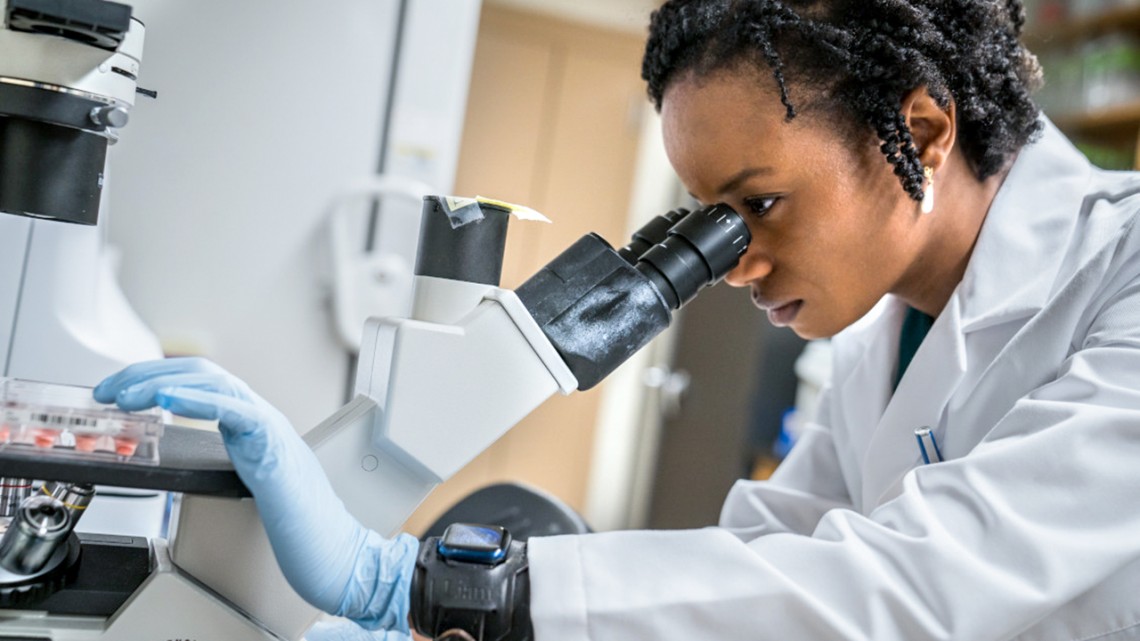
Joeva Barrow, assistant professor of molecular nutrition in the Division of Nutritional Sciences, studies potential treatments for mitochondrial disease in children.
Hartwell award to fund study of mitochondrial disease in children
By Galib Braschler
Joeva Barrow, assistant professor of molecular nutrition in the Division of Nutritional Sciences in the College of Human Ecology, has won a 2022 Hartwell Individual Biomedical Research Award, which funds scientists pursuing early stage, cutting-edge biomedical research to advance children’s health.
Barrow is one of 10 researchers nationwide, representing seven institutions, to receive recognition as a 2022 Hartwell Investigator, and $100,000 of annual support for three years. Each year The Hartwell Foundation invites a limited number of U.S. institutions to nominate candidates from their faculty for consideration. A total of 15 Cornell researchers have received individual awards since 2007.
“I deeply support the mission of The Hartwell Foundation and their commitment to fund biomedical research that aims to find a cure for devastating diseases impacting children in the U.S.,” said Barrow. “I am honored to now be a part of that mission.”
Mitochondrial disease is one of the most commonly inherited human diseases. The average life expectancy of a diagnosed child ranges from five to 10 years for the most severe cases. There is currently no cure or treatment.
Barrow, whose project is titled “Restoration of Bioenergetic Deficiencies in Mitochondrial Disease of Skeletal Muscle,” will use the grant to support her current research program, which aims to identify mechanisms underlying mitochondrial disease.
“Support from The Hartwell Foundation will allow me to test whether a new series of biogenic small molecules are effective in combating mitochondrial disease in primary muscle stem cell systems,” Barrow said. “These results will then be rapidly translated to children with mitochondrial disease.”
Mitochondria serve as the powerhouses that live inside almost every cell in the human body. These tiny organelles primarily produce adenosine triphosphate (ATP), the fuel cells need to function. Continual ATP production is critical to sustaining life. Mitochondrial diseases occur predominantly in children due to mutations in mitochondrial or nuclear DNA. If energy levels from ATP production cannot be maintained, then a child will experience tissue damage which then leads to multisystemic decline and ultimately death.
“The skeletal muscle is often the first to succumb to mitochondrial disease due to its high energetic demand,” Barrow said. As a consequence, the typical first signs of the disease are muscle weakness and ataxia, or difficulty walking.
To understand the processes that cause mitochondrial disease, as well as potential treatments, Barrow and colleagues will begin with preclinical studies in her laboratory, where they will test the therapeutic potential of more than 2,000 unique biomolecules to determine if they can overcome the pediatric mitochondrial mutations in primary muscle stem cells.
Barrow will then advance the most promising molecules to whole body studies in genetic mouse models, through which her research team will perform a host of mitochondrial functional assays to assess restoration and health of the muscle.
“From there, we have partnered with Dr. Marni Falk at the Children’s Hospital of Philadelphia, where our lead biomolecules will be tested directly in human pediatric mitochondrial disease cells,” Barrow said. “Lead molecules that emerge from this translational phase will advance towards established precision clinical trial pipelines.”
In preliminary studies, Barrow’s techniques have already identified three candidates that potently rescue patient-derived mitochondrial-deficient cells. These early results show promise toward developing a novel therapy for mitochondrial disease. “Barrow is an emerging leader investigating mitochondrial disease treatment,” said Patricia Ann Cassano, director of the Division of Nutritional Sciences. “Her research promises to break new ground in developing effective therapy.”
Since 2006, The Hartwell Foundation has funded early-stage biomedical research with the potential to benefit children of the United States. In selecting individuals for the award, the foundation’s goal is to fund innovative and cutting-edge applied research that has not yet qualified for funding from traditional outside sources.
Galib Braschler is a communications specialist for the College of Human Ecology.
Media Contact
Get Cornell news delivered right to your inbox.
Subscribe

